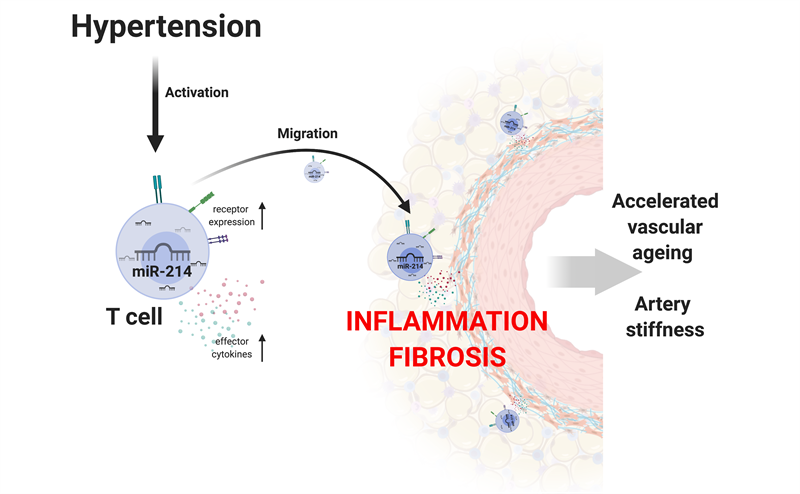New research gives clues to artery problems in high blood pressure

-
A small piece of genetic material could hold the key to diagnosing and treating high blood pressure earlier
-
Research led by University of Glasgow was part-funded by Kidney Research UK
New research by scientists in Scotland has found that a small piece of genetic material could explain why arteries become increasingly stiff (which happens in high blood pressure) and why blood vessels age faster. If found in patient blood samples, this molecule could give doctors an early warning of artery problems, and help people get treatment more quickly.
The researchers pinpointed a piece of genetic material called a micro-RNA – specifically one called miR-214 - which makes white blood cells called T-cells move to the fatty tissue around arteries. Once in this tissue, the T-cells cause inflammation, causing the artery structure to become damaged and increasing their stiffness. This work is the first to link a cascade of damaging events linked to blood pressure to higher levels of miR-214. Dr Laura Denby, Kidney Research UK Senior Research Fellow and a collaborator in this study, had previously discovered that miR-214 caused kidney scarring, or fibrosis, following injury.
Dr Aisling McMahon, Executive Director of Research, Innovation & Policy at Kidney Research UK, said, “Along with diabetes, high blood pressure is a significant cause of chronic kidney disease (CKD) and kidney failure. This research suggests that miR-214 levels might be useful to identify people whose blood vessels are at risk of damage earlier, and could be a good target to develop new treatments. This is important because preventing high blood pressure could ultimately help us reduce CKD and prevent kidney failure developing.”
Professor Tomasz Guzik and Dr Ryszard Nosalski at the University of Glasgow led the research for this paper, T Cell-Derived miRNA-214 Mediates Perivascular Fibrosis in Hypertension, which was published in the journal Circulation Research.
Professor Guzik and Dr Nosalski said, "In this study we used many in vivo, in vitro as well as translational human approaches to identify how small molecule of microRNA that is present in lymphocytes, white blood cells responsible for fighting infections, can direct these cell to blood vessels. This is responsible, at least in part, for the process of accelerated vascular ageing characterised by stiffer vessels. We have shown this not only in disease models but also provided proof of concept in patients with hypertension. These studies provide important insights how hypertension may interact with inflammation.”
ENDS
Funding sources
This study was supported by European Research Council (TJG-InflammaTENSION: ERC-CoG-726318 and AHB–Vascmir: ERC-338991), National Science Centre, Poland (2011/03/B/NZ4/02454), British Heart Foundation (Guzik-FS/14/49/30838; Baker-RG/14/3/30706, CH/11/2/28733) and Kidney Research UK (LD–PD6/2012), MRC (MC, MR/S005412/1), UK Regenerative Medicine Platform (MSS, MR/R015651/1), National Science Centre, Poland (RN funded by 2013/11/N/NZ4/00310).
Media contacts:
Kidney Research UK Press Office: 01733 367 867 or out of hours: 07733 103 830
E-mail: pressoffice@kidneyresearchuk.org
Web: www.kidneyresearchuk.org.uk
Follow us on Twitter: @kidney_research and find us on Facebook, LinkedIn and Instagram
About Kidney Research UK
Founded in 1961, Kidney Research UK is the largest charity dedicated to research into kidney disease in the UK. Our vision is to free lives from kidney disease. We want to prevent kidney disease, transform treatments by funding research, and ultimately find cures for kidney diseases.
In 2018-2019 we invested £8.5million into kidney disease research, supporting 75 studies aimed at improving the understanding of the kidney in both healthy and disease states and transforming treatments.
Find out if you are at risk of kidney disease with our online kidney health check: https://kidneyresearchuk.org/kidneyhealthcheck/


